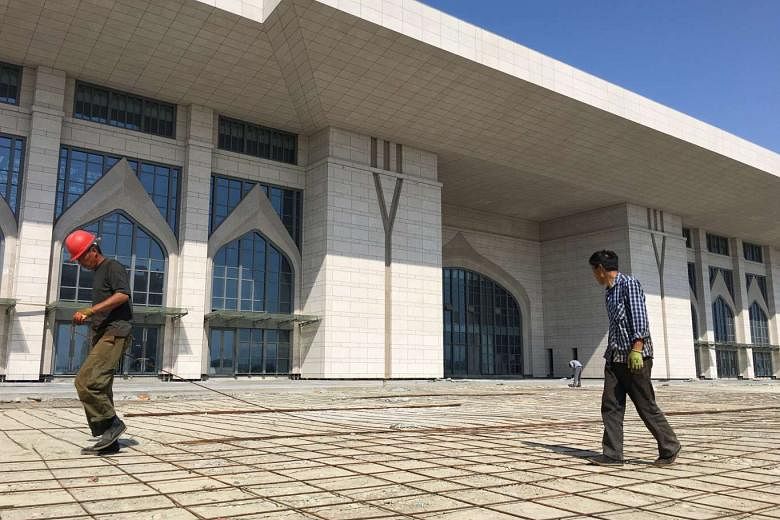With its vast oil reserves and land mass the size of Western Europe, Kazakhstan cannot be more different from tiny Singapore.
But like Singapore, Central Asia's largest economy wants to be the hub for its region. And its desire to tap the Republic's expertise in areas such as urban management, information technology and business services has created opportunities for Singapore companies here.
Large-scale infrastructure plans are already in motion to turn Kazakhstan into a key transport node in China's One Belt, One Road plan to revive the ancient land route connecting China to Europe, businessmen from both countries heard on Thursday at a networking forum in Almaty, its financial capital.
A US$9 billion (S$12.6 billion) economic stimulus plan that Kazakhstan President Nursultan Nazarbayev rolled out in 2014 is set to improve connectivity to China's market of 1.35 billion, and neighbours Kyrgyzstan, Uzbekistan and Russia. This includes the dry port complex at the Special Economic Zone in Khorgos, along the Chinese border, and a 29 billion tenge (S$129.4 million) investment to build a new airport terminal and rebuild a landing strip in capital Astana.
Earlier this month, the first freight train to run from Britain to China - passing through Kazakhstan - departed east England carrying goods such as baby products and vitamins. The 12,000km journey on the land route is expected to take 18 days, half the time it would take by boat.
-
Most advanced ex-Soviet state in Central Asia
-
Kazakhstan, the ninth-largest country in the world by land mass, is the most advanced of the former Soviet states in Central Asia.
The country of 18 million people is much larger in size than the other four Central Asian countries and has the biggest economy, accounting for 60 per cent of the region's gross domestic product.
The other Central Asian countries of Kyrgyzstan, Tajikistan, Turkmenistan and Uzbekistan make up the other 40 per cent.
Kazakhstan's main economic driver is natural resource extraction, but its services sector has been growing. The country has the world's ninth-largest proven oil reserves and is the largest producer of uranium.
Last year, bilateral trade in goods between Singapore and Kazakhstan amounted to S$23.6 million. These included S$18.7 million worth of exports to Kazakhstan,comprising mainly lubricating oil, floating docks and magnetic stripe cards used for things like credit cards. Meanwhile, imports from Kazakhstan totalled S$4.9 million, mainly in petroleum oils, unwrought zinc alloys and chromium trioxide.
There are at least 16 Singapore firms with a presence in Kazakhstan including Educare, supported by Temasek Foundation, which provides training and teaching workshops to educators, and urban development consulting firm Surbana Jurong.
But these infrastructure investments have to be backed by management and operation know-how, and this is where Singapore businesses can come in, said experts.
"What Singapore firms can bring to Kazakhstan is expertise in areas such as city and industrial park planning, and traffic control," said Mr Dmitry Barkov, Asia-Pacific head of Sportmaster Group, a Singapore-listed sporting goods company with a presence in Kazakhstan, Belarus and Ukraine. He cited the successes of Changi Airport International, which acquired its fifth airport in Russia in February as part of a consortium, and Surbana Jurong, which has completed master planning projects in Kazakhstan.
Singapore's strategic location along the Maritime Silk Road, which runs from China's Quanzhou to Africa, and Kazakhstan's position along the Silk Road Economic Belt make the countries natural partners, said Minister of State for Communications and Information, and Health Chee Hong Tat.
"Just as Singapore is the gateway to investing in South-east Asia, we believe that Kazakhstan is the gateway to investing in the Eurasian Economic Union (EAEU) and Central Asia," said Mr Chee, who is also board director of Business China, which organised the forum.
Kazakhstan's location straddling the Chinese dragon and the Russian bear makes the understanding of its past importance, present position and future role critical for anyone who wants to do business in China, said Minister of State for Trade and Industry Koh Poh Koon, who is leading the delegation to China and Kazakhstan.
Singapore is now exploring the feasibility of a free trade agreement with the EAEU, which besides Kazakhstan consists of Russia, Kyrgyzstan, Armenia and Belarus.

